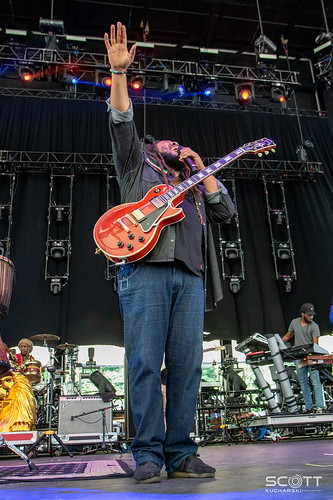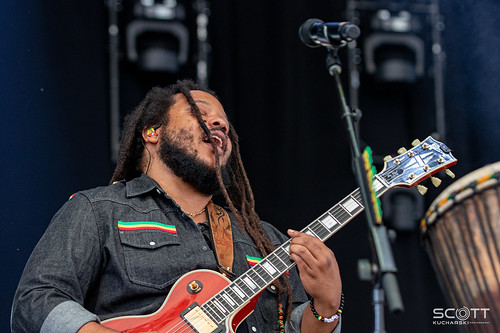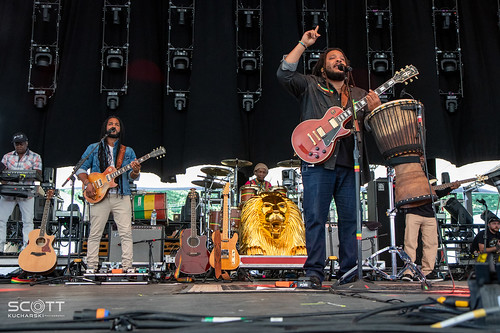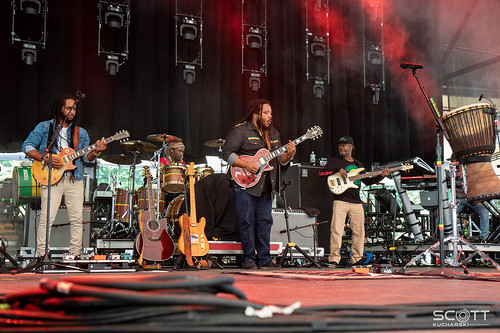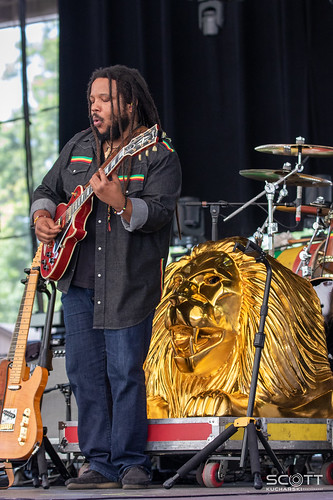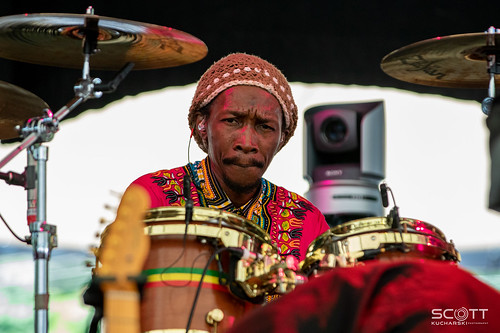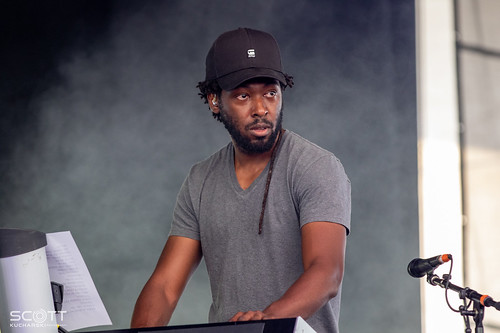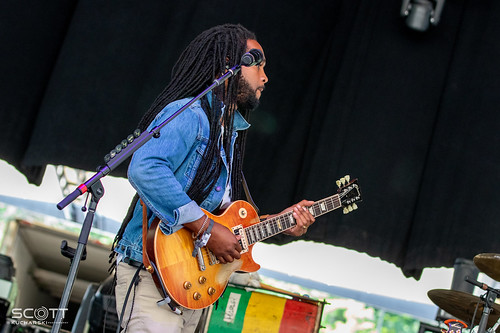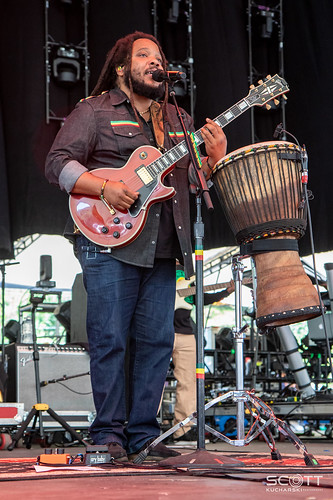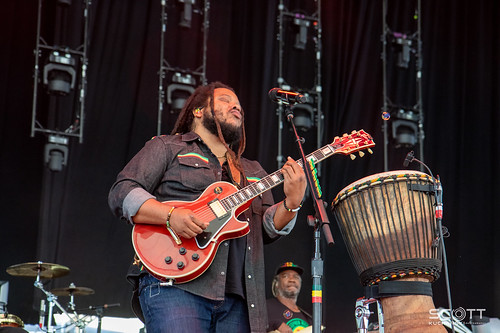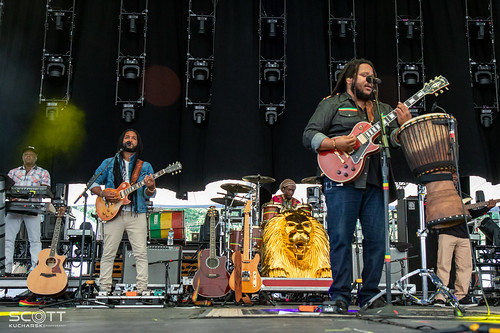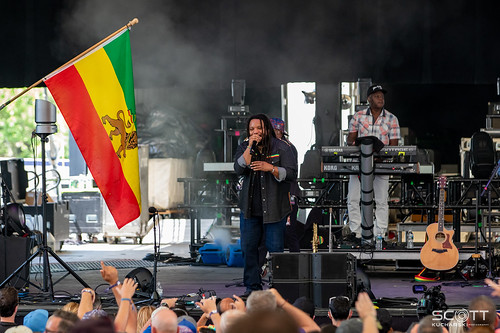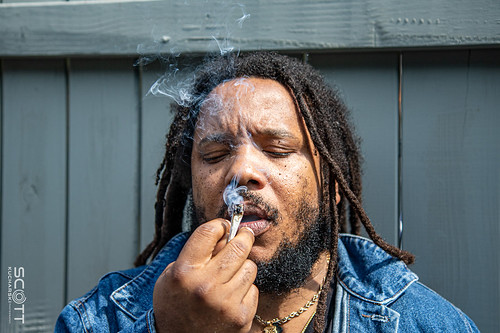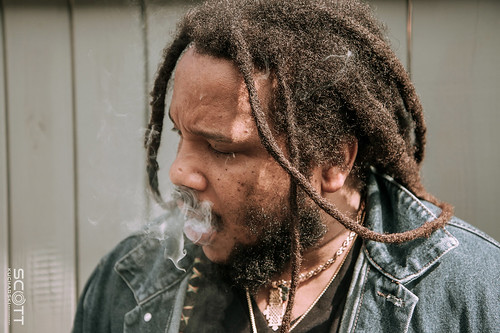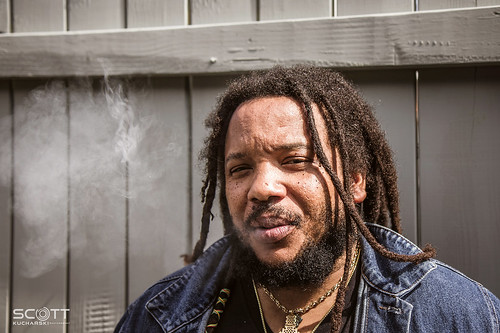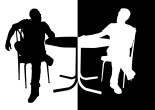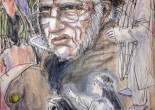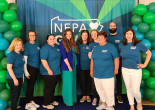At Peach Fest, Stephen Marley talks creativity, family, and witnessing the power of music
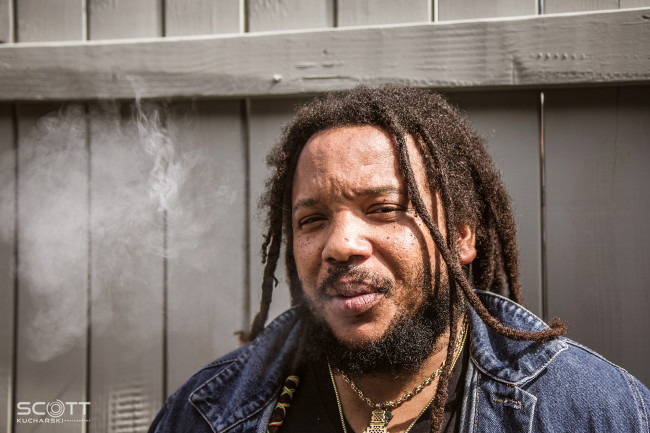
One of the highlights of the 2019 Peach Music Festival was an afternoon set by Stephen “Ragga” Marley, son of the legendary Bob and Rita Marley. Stephen and his band took the stage early on Saturday, July 27 and eased the crowd into what would be a long day of music with a 17-song set of reggae hits, including songs from each of his four solo albums, all of which reached No. 1 on Billboard’s Reggae Album charts, as well as a few covers of his father’s iconic hits, such as “I Shot the Sheriff,” “Stir It Up,” and “Jammin’,” to name a few. The set also included a few of his brother Ziggy Marley’s songs and a rousing cover of Stevie Wonder’s “Master Blaster.”
Following a late Friday night packed with performances, many Peach Fest attendees were just getting their day started as Stephen began, but after a few songs, the Pavilion area was filled with fans dancing and singing along to Stephen’s message of peace and love or, as it was, “One Love.”
He wrapped up with a full-blown sing-along of “Jungle Fever/Could You Be Loved,” during which he brought out three of his children to dance along in choreographed perfection. Near the end, he announced to the crowd, “I’d like you to meet Bob Marley’s grandchildren!” resulting in a huge cheer from all who were left feeling the Marley family’s love and ready for another big day of music on Montage Mountain.
After his set and a quick joint, NEPA Scene conducted an exclusive interview with Stephen on his bus, which was the perfect setting to talk about his past, present, and future, including his current Babylon by Bus Tour, named after his father’s 1978 album.
NEPA SCENE: As someone who started performing at the age of 7 with the Wailers, was music always something you wanted to do or did you grow into it?
STEPHEN MARLEY: I think it was… as far as I can remember, music was always my thing. And my siblings, all of us, we were very musical by nature. The DNA… It’s in the DNA!
NS: Well it obviously turned out to be a great life choice; you’ve won eight Grammys. What album or piece of work are you most proud of at this point?
SM: Wow, that’s a good question. Well, I don’t get a lot of time to reflect, you know, in that way because I am always creating. It’s the creative process that is most [important]. It drives me, the creative part of it, so I’m always most happy creating. But I guess I’d have to reflect and see, but when you are creating, it doesn’t matter how big or how small. It’s about getting the juices flowing.
NS: Fair enough. You’ve just finished playing the Peach Music Festival and tomorrow you’ll be playing the Newport Folk Festival as part of your Babylon by Bus Tour. Do you regularly listen to the type of music featured on these festivals – jam bands, folk bands, bluegrass, etc.?
SM: Not regularly, but I do! I really enjoy those types of music. I enjoy the freedom of it. You know what I mean?
NS: Because of the lack of structure and freedom to jam?
SM: Yeah. It has a very pure form about it. I always tell my musicians, “We must jam on the stage.” Don’t come to entertain. Come to jam and, by jamming, we will entertain. People will be entertained by us jamming.
NS: With that said, do you feel that the response of the crowd on a given day can affect your performance from show to show?
SM: No. Well, I shouldn’t say that. Yes… yes, you know sometimes when they get real rowdy, I get real rowdy too. That said, I come in spirit and it’s always the same spirit.
NS: How do you feel about these larger festivals as far as the vibe? You did an acoustic tour last year which was more intimate. What is more your thing?
SM: To tell you the truth, I just love playing for people. As a musician, you do enjoy the intimacy because you can feel more in the yard type of jamming; it just feels more like your jamming. But I love to address the masses, you know, with love and this message… I think this message of love is for the masses… it’s for the numbers. So [for] that part of it, getting the message out, I enjoy coming to these festivals.
NS: In these times, this message, the message of love, needs to reach the masses more than ever, possibly.
SM: Yes! Yes, exactly.

NS: Are you currently working on any new material?
SM: Right now, my son, he came on stage… he’s finishing up his album. Then we will be starting to work on [my half-brother] Damian’s next record. Me, myself, in the latter part of the year will head into the studio to begin the next record.
NS: Speaking of Damian, you incorporate a lot of hip-hop into your music and the material you produce for Damian. Was your father aware of early hip-hop, and how do you think he would feel about current rap and hip-hop music today?
SM: Yes, he was aware. Actually, he was on tour with Kurtis Blow. He toured with Kurtis because he wanted to get more into the urban community. He wanted to reach the black youth at that time. So yeah, he was aware of that vibe. As far as the current situation, some things he would like, some things he wouldn’t like, much like all of us.
NS: Our editor is a huge comic book fan, so he wants to know what it was like shooting your appearance in an episode of Marvel’s “Luke Cage” for Netflix.
SM: [Laughing] Oh, wow! Incredible. Ziggy is a big comic fan, so being his little brother doing it, it kind of reminded me of him.
NS: Was is difficult or different than what you typically do as a performer?
SM: It was on set. I’m not an actor, so I was really playing, but it wasn’t tough. We did it once, twice maybe. What was tough was the waiting. As a musician, I’m not used to waiting, so that was definitely the toughest part, but it was a great experience.
NS: Speaking of great experiences, what have been some of your favorite shows that you have been a part of, and what makes a show memorable for you?
SM: Well, I’d have to say my most memorable show was a show of my father’s, which me and Ziggy were there in 1980 in Zimbabwe. It was when Zimbabwe was getting independence from Britain, you know, and we were there with him. They had an area, like a VIP, Prince Charles and all those delegates where in that area, and when my father came on the stage, the people pushed forward and so the British Army and tear gas…
NS: Really? Wow.
SM: Yes… yes that was my first experience with a situation like that. And why it’s so memorable, though, it was then… because I was, what, 8 [years old]? But it was then, that concert specifically, being there at that age and experiencing it, that I then knew the power of music. Because my father was not a politician, he had only come there to sing, but just the movement, the people, the music liberated the people, you know? That was definitely the most memorable concert for me.
NS: What a fantastic memory of what had to be a powerful moment for everyone in attendance. Thank you for sharing. Finally, please talk about the global outreach you have through your charity, the Ghetto Youths Foundation.
SM: Well, my family, all of us, the legacy… charity, or what they’d classify as charity, is a big part of us always, from my dad and my mother coming up, so we are always giving. So we formed a foundation where others can help the cause. Through the foundation, we do a lot of wonderful things. We feed the elderly. We help school children, where smart kids who can’t afford books or can’t afford the school fee [can get assistance]. We focus on education. We feel that education is the key to liberating yourself, so that is a big part of everything with the foundation. It’s funny because in our beliefs, we don’t have a religion, but we have beliefs. I am a Rasta man, so I have a way of life and the Bible is a big part of our way of life, you know? And in the Bible, it says you mustn’t speak about your charity, so we have a hard time speaking about what we do for people. Do you know what I mean? So, really, the foundation is there to speak for itself. It’s the Ghetto Youths Foundation. You can look it up, please.
NS: Basically, you aren’t looking to take any credit or to brag about what you do through the foundation, but people still need to be aware of it, right?
SM: Exactly. I want people to know about it.
NS: Thank you, Stephen, for your time and the performance today at the Peach. Enjoy the rest of the tour and safe travels to you, your family, and crew.
SM: Thank you. Same to you.
For more information on the Ghetto Youths Foundation, visit ghettoyouthsfoundation.org. The Babylon by Bus Tour stops at The Stone Pony (913 Ocean Ave., Asbury Park, NJ) this Thursday, Aug. 8 at 7 p.m. and continues through September. See a full list of tour dates at stephenmarleymusic.com.
Read NEPA Scene’s other Peach Music Festival interview with rising star Maggie Rose here and see all of the photos from the 2019 Peach Fest here.
Scott is a photographer, Teamster, and all-around music nerd. He loves antique and vintage items and people. He is a sucker for a carnival, fair, or freak show. He loves a good burger but has never eaten a steak.

